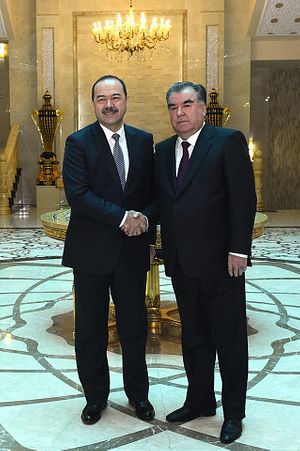Uzbek Prime Minister Abdulla Aripov’s two-day working visit to Tajikistan appears to be a success, setting the stage well for Uzbek President Shavkat Mirziyoyev’s proposed visit later this year.
The headline items of the prime minister’s meetings with Tajik officials, including Tajik President Emomali Rahmon, are a planned agreement to ease visa restrictions and progress on a contentious section of the border.
According to government sources cited by Asia-Plus, a Tajik news site, one agreement expected to be finalized in the near future — presumably during Mirziyoyev’s visit — will allow citizens of each state to visit the other visa-free for up to a month. There was also talk about opening bus and train routes as well as new border checkpoints to facilitate movement between the two countries.
These measures build on previous accomplishments smoothing travel and trade between the two countries. One of Mirziyoyev’s early accomplishments was the resumption of flights between Tashkent and Dushanbe in April 2017. On January 3, 2018, Asia-Plus, reported that Uzbekistan’s national airline, Uzbekistan Airways, had proposed opening additional routes from Samarkand and Bukhara.
Offering visa-free travel should make such flights more popular.
Aripov’s visit also appears to have made progress in managing a contentious section of the border around the Farkhad Dam. The dam, located on the Tajik-Uzbek border where Tajikistan’s Sughd region meets Uzbekistan’s Sirdaryo region, was completed in 1949. The dam and its facilities have been contested territory since independence. According to Asia-Plus, the agreement at hand would recognize the land around the dam as Tajik territory but the dam itself would be recognized as Uzbekistan’s. Site security responsibilities would fall to Tajikistan while operations would be managed by Uzbek engineers.
Agreeing on the status of the dam would be a key step in normalizing relations across that section of the border, but also would mark promising progress in the general discussion of borders and water. Borders have been an area of success for Mirziyoyev, who has moved the needle on settling borders with Kyrgyzstan, Kazakhstan and Turkmenistan over the past year.
Mirziyoyev’s visit to Tajikistan is rumored to be planned for the spring; whenever it happens it will be burdened with high expectations. Signing agreements is a first step, then comes the laborious work of implementation and managing inevitable setbacks and unexpected challenges.

































